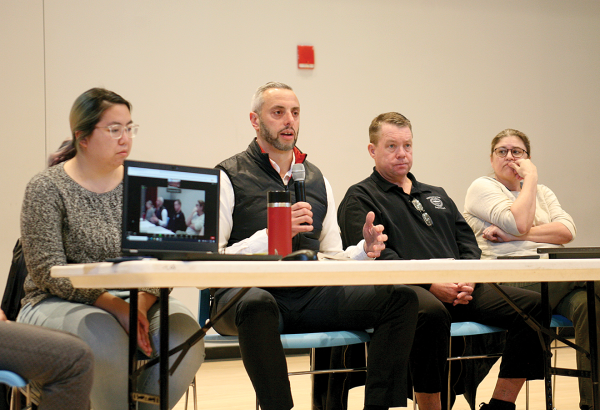April 3, 2024

Jascha Franklin-Hodge, chief of streets for the city (second from left), kicked off the meeting on Monday night at the Brooke Charter School. Photo by Seth Daniel
Members of the city’s Public Improvement Commission (PIC) convened a rare hearing at Dorchester’s Brooke Charter school on Monday night in hopes of breaking a stalemate involving ownership rights of residential streets laid out as part of a the Harvard Commons development. The streets and other infrastructure like lights, sidewalks, and sewers – specifically on Senator Bolling Circle and Snowden Way off of Harvard Street – are currently privately owned and not under the control of city agencies, meaning that individual homeowners themselves must foot the bill to pay for repairs and upkeep.
On Monday, commissioners from PIC and Boston’s chief of streets heard directly from frustrated residents, most of whom indicated that they want to end the confusion and have the city of Boston take full ownership of the streets and infrastructure. By becoming public ways, the streets would be maintained and paid for like most city streets— using public tax dollars.
Monday’s hearing was an initial step in what is known as a “Betterment Process” – which has become a rarity in older cities like Boston, which doesn’t often add new streets to its atlas.
Jascha Franklin-Hodge, the chief of streets and chair of the PIC, said on Monday that the group took the unusual step of meeting in a neighborhood setting to respond to an extraordinary demand to resolve complaints.
“We believe on the advice of our attorneys that we have sufficient public interest and support in pursuing the Betterment Process and allowing it to proceed,” said Franklin-Hodge. “We are not dictators,” he added. “Our goal is not to exercise our authority unilaterally…Betterments are not commonplace. ”
There will be a cost to homeowners to transition their streets to the public rolls. Current estimates reveal it to be between $2,000 and $2,400 per homeowner based on a formula calculated using property frontage. The charge would be attached as a lien to resident tax bills, and owners can pay up front or stretch it over 10 to 20 years at 7 percent interest.
The clear majority of the 54 homeowners who turned out and voted on the matter— roughly 80 percent by the Reporter’s count— want their streets to “go public.” However, there were voices of dissent from several people, including residents who have filed a pending lawsuit against the city and Cruz Construction, whom they blame for not getting the streets made public already.
Cruz, the developer who built out the homes and the new streets over the last 15 years, did not respond to a request for comment from the Reporter. Critics say Cruz is to blame for not telling homebuyers about the private way status— and they want it to pay the fees.
“No one ever told us we would have to pay for the road,” said Marjorie Codrington, of Snowden Way, during public comment on Monday. “To me all this is illegal, or maybe I’m foolish…We were deceived, and we need someone to protect us. If the city and its government isn’t going to protect us, who will?”
But other neighbors disagreed, saying, basically, that they felt it was time to swallow the bitter medicine and lock in current costs before they increase.
“It’s an insurance policy to mitigate the expenses – protection,” said resident Mark Koeck. “In a nutshell, this has been going on for five years…This didn’t happen overnight and didn’t surprise people. When Marjorie said she felt ‘foolish,’ well so do I. But there’s a time to cut bail and move on, but not everyone can.”
According to state Rep. Russell Holmes, the current dispute began when one of his constituents called in a request to fix a sidewalk that had buckled in 2019. When Holmes asked the city to fix it, they said it was a private way, and the repair was the responsibility of the homeowner.
Holmes argues that the best course of action is to move forward with a change to public ownership. He hailed Monday’s vote by residents as “the right decision. ”
Those adamantly against the vote include residents Aalana Feaster, Darien Spruill, Lenora Cruz and Etlyn Steele. Together, they filed a lawsuit last month in Suffolk Superior Court to try to slow down the process. The case is pending.
Feaster said the PIC was rushing the process and should hold off until after their complaints are heard in court. She explained they would like the street to be public, but believe the developer, Cruz, should foot all the costs – particularly since they received city and state grants in the past to bring the streets up to code and public.
“We are saying … allow the courts to make a decision and then we can revisit it, but you’re speeding it up, so the process here gets decided before the courts have decided,” she said. “That is problematic.”
Feaster said they will file an injunction to stop an April 11 acceptance vote by PIC.


